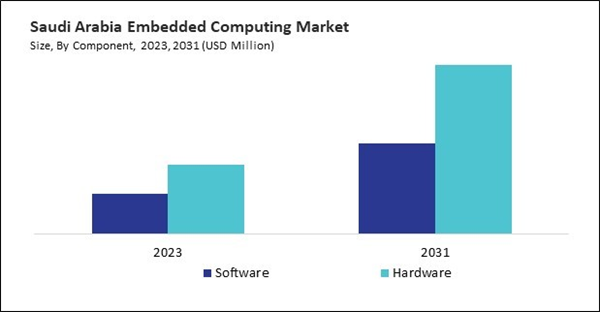The Brazil market dominated the LAMEA Embedded Computing Market by Country in 2023, and is expected to continue to be a dominant market till 2031; thereby, achieving a market value of $1.76 billion by 2031. The Argentina market is showcasing a CAGR of 12.7% during 2024-2031. Additionally, the UAE market would register a CAGR of 10.1% during 2024-2031.
They offers a solution as industries focus on sustainability and reducing energy consumption. Embedded systems are designed to operate with minimal power, making them ideal for energy-efficient applications. For instance, in the automotive sector, embedded systems contribute to fuel-efficient vehicles by optimizing engine performance and managing energy usage in electric vehicles.
Another reason for the widespread adoption of embedded computing is its cost-effectiveness. Embedded systems' modular nature allows companies to design specialized solutions tailored to their needs without the complexity and cost of general-purpose computing systems. Embedded systems can be produced at scale and implemented across various applications using low-cost processors, memory, and other components.
Brazil’s power sector is undergoing a remarkable transformation, primarily driven by the country’s push for renewable energy. According to the International Trade Administration, renewable energy accounts for a staggering 83% of Brazil’s electricity matrix, a figure well above the global average of about 25%. The shift toward renewable energy sources such as hydropower, wind, solar, and biomass has been a cornerstone of Brazil’s energy strategy.
The healthcare sector in the UAE has been growing rapidly in recent years, driven by increasing investments, a growing population, and a strong governmental focus on enhancing the quality of healthcare services. According to the ITA) the UAE's 2022 federal budget allocated a significant portion - approximately 8.4% of total public spending (around USD 15.8 billion or AED 58.931 billion) - towards healthcare. Therefore, the rising power sector and expansion of the region's healthcare industry are driving the market's growth.
List of Key Companies Profiled
- Fujitsu Limited
- Intel Corporation
- IBM Corporation
- HCL Technologies Ltd.
- Microsoft Corporation
- Qualcomm Incorporated (Qualcomm Technologies, Inc.)
- Renesas Electronics Corporation
- STMicroelectronics N.V.
- Texas Instruments, Inc.
- NXP Semiconductors N.V.
Market Report Segmentation
By Component
- Software
- Hardware
- Microcontroller (MCU)
- Microprocessor (MPU)
- Digital Signal Processor (DSP)
- Other Hardware Type
By End User
- Consumer Electronics
- Communications
- Industrial
- Automotive
- Healthcare
- Energy
- Other End User
By Country
- Brazil
- Argentina
- UAE
- Saudi Arabia
- South Africa
- Nigeria
- Rest of LAMEA
Table of Contents
Companies Mentioned
- Fujitsu Limited
- Intel Corporation
- IBM Corporation
- HCL Technologies Ltd.
- Microsoft Corporation
- Qualcomm Incorporated (Qualcomm Technologies, Inc.)
- Renesas Electronics Corporation
- STMicroelectronics N.V.
- Texas Instruments, Inc.
- NXP Semiconductors N.V.









